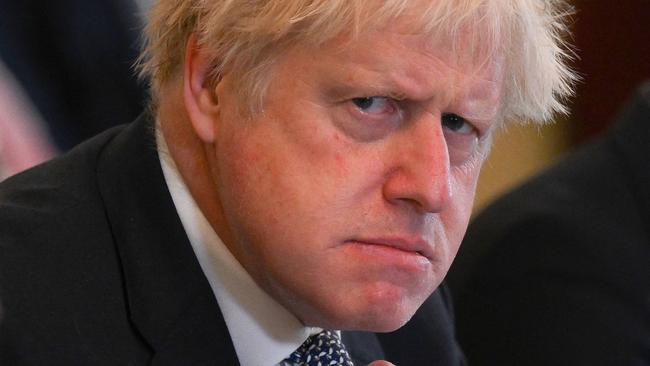Former PM Boris Johnson was facing suspension for 20 days
In first intervention since standing down as an MP, he accuses the Cabinet Office of deliberately frustrating the Covid inquiry.

Boris Johnson deliberately and recklessly misled the Commons and would have received a 20-day suspension if he had stayed on as an MP, an investigation into the former British prime minister is expected to find.
The privileges committee is investigating Mr Johnson after the former Tory leader denied that any guidance or rules were broken in Downing St during lockdown restrictions.
The cross-party group of MPs found that Mr Johnson’s comments were misleading and sent him its draft recommendations last week for a response. Its proposal of a 20-day suspension far exceeded the 10-day threshold that could trigger a by-election.
Mr Johnson chose to quit and said he was the victim of a “witch-hunt”, describing the committee as a “kangaroo court”.
It committee was to meet overnight on Monday and is expected to publish its report as soon as Tuesday.
The committee, which includes four Tory MPs, is required by a motion of the Commons to conclude its investigation and publish its findings. It will stop only if the government tables a “rescinding motion”, something that it is unlikely to do.
In his first intervention since standing down as an MP on Friday, Mr Johnson accused the Cabinet Office of deliberately frustrating a separate inquiry into his government’s handling of he Covid pandemic after it warned him against disclosing hundreds of pages of unredacted WhatsApp messages and his notebooks.
The former prime minister has offered inquiry chairwoman Heather Hallett the opportunity to review “any of the unredacted material in my possession” after the Cabinet Office refused to release it.
The Cabinet Office has begun a judicial review as it seeks to prevent the release to the inquiry of any material it considers to be “unambiguously irrelevant”.
It wrote to the inquiry last week warning that Mr Johnson risked undermining the review if he released his messages unilaterally. It also raised national security concerns.
Mr Johnson told The Times that the Cabinet Office was “foot-dragging” and accused it of wasting “public time and money”. He also said that it was refusing to return his notebooks from his time in office because it fears he would turn them over to the inquiry.
“The Cabinet Office has blocked me from directly sharing unredacted material with the inquiry despite my repeated attempts to do so,” Mr Johnson said. “The government wants the whole matter to be decided by the courts, even though government ministers are on record saying that litigation is pointless because the government will not win.
“The Cabinet Office’s foot-dragging approach to the inquiry is costing public time and money. The inquiry’s work is crucial. We must explore what happened during Covid … and the government’s position is now – in my view – frustrating the inquiry’s work.”
Mr Johnson said in his resignation statement that he wanted the privileges committee to stop its investigation and accused it of carrying out a “political hit job”.
He said that Ms Harman, the former deputy leader of the Labour Party, had shown “egregious bias”. Ms Harman had criticised Mr Johnson on Twitter over Downing St parties when revelations emerged.
Sir Charles Walker, a Tory MP on the committee, has accused Mr Johnson’s allies of conducting a “concerted” campaign to “delegitimise” the investigation. Mr Johnson’s approach to the inquiry, in which he accused members of bias and his supporters criticised it, is understood to have led to a tougher sanction.
The committee also considered new claims that Mr Johnson may have breached lockdown rules with a series of visits by friends and family to Downing St and Chequers, the prime minister’s country home.
However, it did not reach any conclusions about the visits, which have been passed to police for further consideration, because each would require further investigation.
THE TIMES



To join the conversation, please log in. Don't have an account? Register
Join the conversation, you are commenting as Logout